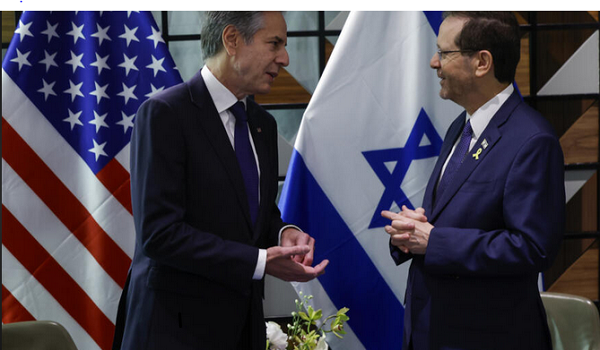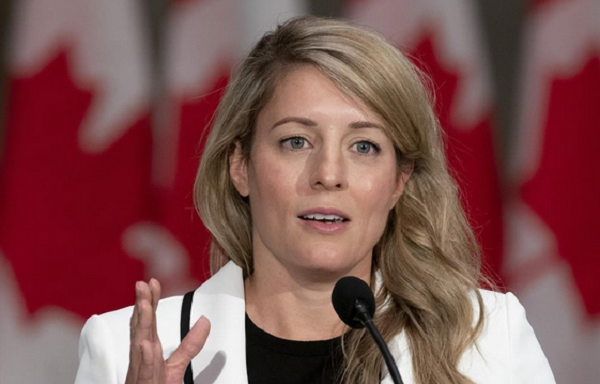Blinken calls on Israel and Hamas to proceed with a truce deal and says ‘the time is now’
U.S. Secretary of State Antony Blinken met with Israeli leaders on Wednesday in his push for a cease-fire deal between Israel and Hamas, saying “the time is now” for an agreement that would free hostages and bring a pause in the nearly seven months of war in Gaza.
He said Hamas would bear the blame for any failure to get a deal off the ground.
Blinken is on his seventh visit to the region since the war erupted in October in his bid to secure what’s been an elusive deal between Israel and Hamas that could avert an Israeli incursion into the southern Gaza city of Rafah, where hundreds of thousands of Palestinians are sheltering.
The current round of talks appears to be serious, but the sides remain far apart on one key issue — whether the war should end as part of an emerging deal.
“We are determined to get a cease-fire that brings the hostages home and to get it now, and the only reason that that wouldn’t be achieved is because of Hamas,” Blinken told Israel’s ceremonial President Isaac Herzog at a meeting in Tel Aviv.
“There is a proposal on the table, and as we’ve said, no delays, no excuses. The time is now,” he
Blinken said the deal would also allow much needed food, medicine and water to get into Gaza, where the war has sparked a humanitarian crisis and displaced much of the territory’s population.
Blinken also met with Israeli Prime Minister Benjamin Netanyahu, though no details about the meeting were immediately available.
Earlier, after meeting with Herzog and also with families of Americans held by Hamas at his hotel, Blinken briefly greeted several dozen demonstrators calling for an immediate hostage release deal on the sidewalk outside.
Chanting “SOS, USA, only you can save the day” and “In Blinken we trust, bring them home to us,” the protesters urged him to make their case to Netanyahu.
Blinken told the families that there was a very strong proposal on the table and that Hamas needs to say yes to it. “That is our determination, and we will not rest, we will not stop until you’re reunited with your loved ones,” he said.
His comments came on the last leg of his regional visit, with previous stops in Saudi Arabia and Jordan, where he urged Hamas to accept the latest proposal, calling it “extraordinarily generous” on Israel’s part.
According to the State Department, he will also visit an Israeli port where aid for Gaza is entering.
The United States has staunchly supported Israel’s war since Hamas’ unprecedented attack on Oct. 7 into southern Israel. But it has grown increasingly critical of the staggering toll borne by Palestinian civilians in Gaza and has been especially outspoken against Israel’s plan to invade Rafah, Gaza’s southernmost city where some 1.5 million Palestinians have fled from fighting elsewhere in the territory.
Washington has warned Israel against any offensive that puts civilians at risk.
Netanyahu has repeatedly vowed to invade Rafah, which he says is Hamas’ last stronghold in the coastal strip, and on Tuesday he pledged to do so “with or without” a cease-fire deal.
The current deal that is being discussed — brokered by the U.S., Egypt and Qatar — would see the release of dozens of hostages in exchange for a six-week halt in fighting as part of an initial phase, according to an Egyptian official and Israeli media. Hundreds of Palestinian prisoners held by Israel would also be released, including some serving long sentences.
But a sticking point remains over what happens next. Hamas has demanded assurances that an eventual release of all hostages will bring a complete end to Israel’s nearly seven-month assault in Gaza and a withdrawal of its troops from the devastated territory.
Israel has offered only an extended pause, vowing to resume its offensive once the first phase of the deal is over. The issue has repeatedly obstructed efforts by the mediators during months of talks.
While the talks appeared to be gaining steam, on Wednesday, an Egyptian official said that Hamas had asked Egyptian and Qatari mediators to provide clarity on the terms of the latest cease-fire proposal being discussed, a demand that could delay progress.
The official, who has close ties to the talks and who spoke on the condition of anonymity in order to freely discuss the deal, said Hamas wants clear terms for the unconditional return of displaced people to the north of Gaza and to ensure that the second stage of the deal will include discussing the gradual and complete withdrawal of all Israeli troops from the entire Gaza Strip.
The official said the current outline didn’t fully explain who would be allowed to return north and how it would be decided.
While talks are ongoing, the fighting in Gaza continues. Late Tuesday, an Israeli airstrike hit a house in central Rafah — a city Israel has struck repeatedly despite the masses that have taken refuge there — killing at least two children, according to hospital authorities. The bodies of the dead children were taken to the Abu Yousef al-Najjar hospital. An Associated Press journalist saw the bodies at the hospital morgue as their relatives mourned the deaths.
On Wednesday, Israel’s military said it was operating in central Gaza, where it said jets struck militants, including one said to be setting up explosives.
The Israel-Hamas war was sparked by the unprecedented Oct. 7 raid into southern Israel in which militants killed around 1,200 people, mostly civilians, and abducted around 250 hostages. Israel says the militants are still holding around 100 hostages and the remains of more than 30 others.
The war in Gaza has killed more than 34,000 Palestinians, according to local health officials. The war has driven around 80% of Gaza’s population of 2.3 million from their homes, caused vast destruction in several towns and cities and pushed northern Gaza to the brink of famine.
This article was first reported by AP












